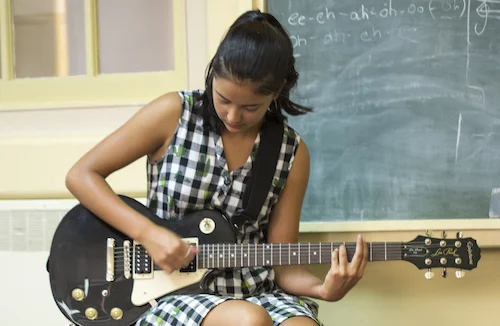GIRLS INVENTED PUNK ROCK, NOT ENGLAND:
A WEEK AT GIRLS ROCK! CAMP
A WEEK AT GIRLS ROCK! CAMP
Words by Chiara Grassia
Photos by Mia Mala McDonald
* This article originally appeared in Issue 1 of Gusher - buy digital version of mag here *
It’s summer. I’m sitting on the floor, crossed-legged, in a school hall in Portland, Oregon, with a dozen other twenty-somethings. “For a week, we create the world that we want to live in, not the world we actually live in,” says one of the coordinators. She waves her arms about as she talks about out there, the real world that lies beyond. Her voice carries such certainty. They are only words and it’s only a week but I can feel this space and the real world drifting further apart.
Three years later and I’m sitting in an old school hall in my hometown of Canberra, Australia, reciting the same speech to a circle of volunteers. We’re all nervous; uncertain. I’ve spent the last three years volunteering at Girls Rock Camps in the US, the past year writing academically about the types of social transformations these spaces generate. These camps aim to create an environment that challenges and dismantles social norms which are damaging to girls, such as low confidence in abilities, jealousy, and casual discrimination, while encouraging self-expression and fostering confidence in abilities. The formula is simple: girls ages between 10-17 years old meet on Monday and form bands, learn an instrument and write a song within their groups to be performed at a showcase on the weekend. The days are structured - morning instrument instruction, lunchtime performance from a local or touring band, afternoon band practice and hour long, self-contained workshops - but the flow of the day is pretty loose. The program provides the tools - female mentors, music gear, a room to practice in - and rest is up to the girls.
On Monday, it feels surreal to step into the actualised space - a space created by theoretical ideas and lived frustrations; a space fuelled by hope and wonder. This week, there are 42 girls participating, the majority of whom have never picked up their instrument of choice (guitar, bass, drums or vocal) before this week. Guiding the girls for the week are 35 adult volunteers, the majority of whom are in direct leadership positions - instrument instructors, band managers and coaches (to assist during band practice), workshop leaders and an assembly leader (to instruct the morning punk rock aerobics - windmills and daggy dance moves to the likes of Joan Jett, Le Tigre and M.I.A), as well as support crew and roadies. By 11am, the girls have powered through introductions and forced mingling, and formed bands and gained a band manager and coach. Sprawling out on the wooden floors of the main hall around a square of butchers paper, they scrawl down potential band names, a few making the cut before noon, among them; Mum, It’s Not A Phase, Pineapple Paradise, Jesus + The Virgin Marys and Hiposicles.
It’s exhausting, draining, hearing the same messages over and over - you can’t do this, you can’t say that, you don’t belong here. These micro aggressions build up. The body grows tired; shrinks. Entering a Girls Rock Camp is like stepping into another world. The absence of some bodies (cis male) juxtaposed against the visibility of others: female, queer, different ages, shapes, sizes, backgrounds. Reframing other women as mentors and peers rather than competition. Habits you didn’t even know you had start to reveal themselves - constant self-deprecation, distrusting other women, constantly apologising for self-perceived mistakes. Behaviours start to change. It’s important to have distinct spaces for youth that exist outside school; for narratives of women that exist outside of heteronormativity. By the end of the week, each girl has contributed to a song, made a zine, screen printed a t-shirt with their band’s logo, participated in an improv comedy class, danced during the lunch time band, and practiced in front of their peers. It’s a safe place, a real life place, to talk, proof that spaces like this can exist outside the bounds and constrains of the Internet.
Each day feels like a week - a throwaway line becomes the start of a verse, a chord progression becomes the basis of the chorus. By Tuesday, a few of the bands have already written several songs each. I spend the afternoons running around the building, checking in on workshops and band practice. From the other side of the room I hear loud, distinctive punk drums and yelling, and immediately rush over to listen.
“No mums in the house!” A 10 and a half year old shouts defiantly. The drummer immediately follows, swiftly smashing the floor tom several times - it sounds like someone rushing down the stairs. “No dads in the house!”
I recognise the singer - on Monday morning she was hiding behind her dad and sister, wiping back anxious tears. Now she’s thrashing around, all fist pumps and pogo jumps, her words barely hitting the microphone but still rising above the noise. “No dads in the house / This is my house / Just me and my candy sitting on the couch!”
There’s a breakdown before the last chorus - a complex bass line followed by a slow, intricate guitar solo.
All the adults in the room clap wildly; the band grins.
“How long have you been playing your instrument?” I ask each member individually, receiving the same response each time -
“Since yesterday.” ■




